Abstract
In this paper, we introduce EVE, a generic framework for event detection where events can also include outliers, model changes and drifts. Various methods for event detection have been proposed for different types of events. However, many of them make the same or very similar prior assumptions but use different notations and formalizations. EVE provides a general framework for event detection, which allows existing algorithms to be represented using a common basis. The framework includes generic types of time slots, streaming progresses, and measures of similarity between those slots. We demonstrate how existing algorithms fit nicely into this framework by instantiating appropriate window combinations, progress mechanisms, and similarity functions.










Similar content being viewed by others
Notes
The corresponding data generation workflow can be downloaded from the KNIME Example Workflows server at http://www.knime.org/example-workflows
References
Adä I, Berthold MR (2010) The new iris data: modular data generators. In: Proceedings of the 16th ACM SIGKDD international conference on knowledge discovery and data mining, KDD ’10. ACM, New York, pp 413–422
Adä I, Berthold MR (2011) Unifying change-towards a framework for detecting the unexpected. In: Data mining workshops (ICDMW), 2011 IEEE 11th international conference on data mining
Aggarwal CC (2003) A framework for diagnosing changes in evolving data streams. In: Proceedings of the 2003 ACM SIGMOD international conference on Management of data, SIGMOD ’03. ACM, New York, pp 575–586
Baena-García M, Del Campo-Ávila J, Fidalgo R, Bifet A, Gavaldà R, Morales-Bueno R (2006) Early drift detection method. In: Fourth international workshop on knowledge discovery from data streams, vol 6. Citeseer, pp 77–86
Berthold MR, Cebron N, Dill F, Gabriel TR, Kötter T, Meinl T, Ohl P, Sieb C, Thiel K, Wiswedel B (2007) KNIME: The Konstanz Information Miner. In: Studies in Classification, Data Analysis, and Knowledge Organization (GfKL 2007). Springer, Berlin
Bifet A (2010) Adaptive stream mining: pattern learning and mining from evolving data streams, vol 207. Frontiers in Artificial Intelligence and Applications. IOS Press, Amsterdam
Bondu A, Grossin B, Picard M (2010) Density estimation on data streams: an application to change detection. EGC (Extraction et Gestion de Connaissances)
Chandola V, Banerjee A, Kumar V (2009) Anomaly detection: A survey. ACM Comput Surv 41(3):15:1–15:58
Dries A, Rückert U (2009) Adaptive concept drift detection. Stat Anal Data Min 2(5–6):311–327. doi:10.1002/sam.10054
Gama J (2010) Knowledge discovery from data streams. Chapman & Hall/CRC, Atlanta
Gama J (2012) A survey on learning from data streams: current and future trends. Prog Artif Intell 1:45–55. doi: 10.1007/s13748-011-0002-6
Gama J, Medas P, Castillo G, Rodrigues P (2004) Learning with drift detection. In: Bazzan A, Labidi S (eds) Advances in artificial intelligence SBIA 2004. Lecture notes in computer science, vol 3171. Springer, Berlin, pp 66–112
Hoens T, Polikar R, Chawla N (2012) Learning from streaming data with concept drift and imbalance: an overview. Prog Artif Intell 1:89–101. doi: 10.1007/s13748-011-0008-0
Japkowicz N, Myers C, Gluck M (1995) A novelty detection approach to classification. In: International joint conference on artificial intelligence
Kifer D, Ben-David S, Gehrke J (2004) Detecting change in data streams. In: Proceedings of the Thirtieth international conference on VLDB, vol 30, VLDB ’04, pp 180–191. VLDB Endowment
Kullback S (1987) The Kullback-Leibler distance. Am Stat 41:340–341.
Markou M, Singh S (2003) Novelty detection: a review–part 1: statistical approaches. Signal Process 83(12):2481–2497. doi:10.1016/j.sigpro.2003.07.018
Minku L, White A, Yao X (2010) The impact of diversity on online ensemble learning in the presence of concept drift. Knowl Data Eng IEEE Trans 22(5):730–742
Ross GJ, Adams NM, Tasoulis DK, Hand DJ (2012) Exponentially weighted moving average charts for detecting concept drift. Pattern Recognit Lett 33(2):191–198
Shewhart W (1980) Economic control of quality of manufactured product, vol 509. American Society for Qualit
Tsymbal A (2004) The problem of concept drift: definitions and related work. Computer Science Department, Trinity College, Dublin
Widmer G, Kubat M (1996) Learning in the presence of concept drift and hidden contexts. Mach Learn 23(1):69–101
Yamanishi K, Takeuchi J (2002) A unifying framework for detecting outliers and change points from non-stationary time series data. In: Proceedings of the eighth ACM SIGKDD international conference on Knowledge discovery and data mining. ACM, pp 676–681
Zliobaite I (2009) Learning under concept drift: an overview. Technical report. Faculty of Mathematics and Informatics, Vilnius University, Vilnius
Acknowledgements
This research was supported in part by the DFG under grant GRK1042 (Research Training Group “Explorative Analysis and Visualization of Large Information Spaces"). Special thanks to the anonymous reviewers for their constructive feedback.
Author information
Authors and Affiliations
Corresponding author
Rights and permissions
About this article
Cite this article
Adä, I., Berthold, M.R. EVE: a framework for event detection. Evolving Systems 4, 61–70 (2013). https://doi.org/10.1007/s12530-012-9067-0
Received:
Accepted:
Published:
Issue Date:
DOI: https://doi.org/10.1007/s12530-012-9067-0




